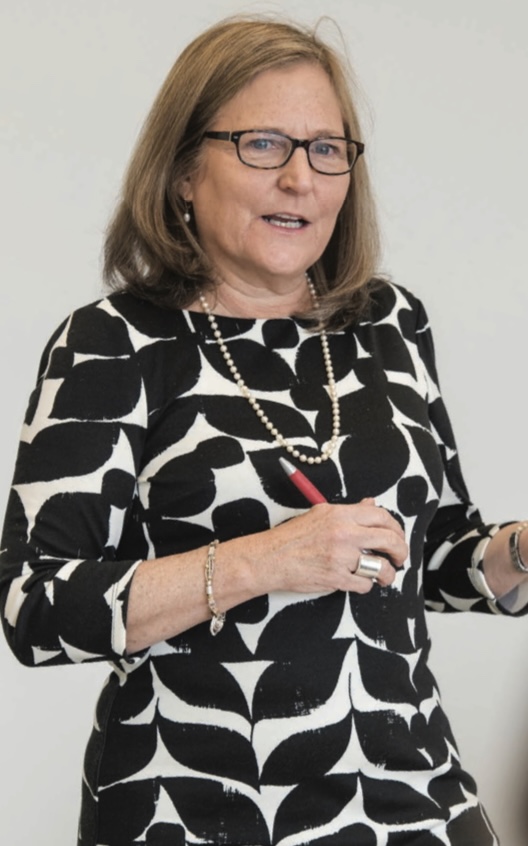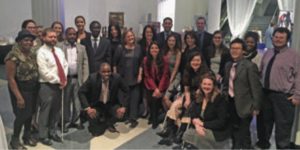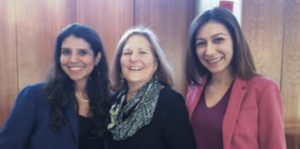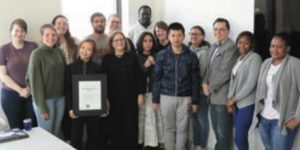
Helping to Make the World a Better Place for All
In 2002, a first-year law student arrived in Syracuse from Texas after hearing about
a new course in disability law, taught by Professor Arlene Kanter. She and other students soon prodded Kanter to offer more disability-related courses so they would be equipped with the knowledge and skills needed to secure a job in the relatively new field of disability law.
It took little prodding for Kanter to agree. By 2005, the faculty had approved the nation’s first Disability Law and Policy Program (DLPP), one that included the first joint degree in law and education, with a concentration in disability studies.
The Texan student was Julie Morse G’05, L’05. She and Crystal Doody G’05, L’05 became the DLPP’s first graduates. Both work at Legal Services of Central New York in Syracuse, representing individuals and families with disabilities, as well as clients with low incomes, on a broad array of legal issues confronting them. Over the past 15 years, DLPP has enrolled more than 300 students from the US and 14 other countries.
“Students bring questions that I would never think of, due to their geographic diversity, familiarity with technology and social media, and often their lived experiences as young adults with a disability.”
Passion & Persistence
Responding to the growing student interest in disability law with passion and persistence, Kanter worked closely with faculty in the School of Education to establish a new University-wide Disability Studies Program as part of her project for the 2005 Meredith Professor of Excellence in Teaching Award.
In fact, Syracuse University’s long history of disability research and advocacy was one of the reasons Kanter accepted her tenure track position in 1988. Faculty from the University’s Center on Human Policy had been experts in cases she worked on as a lawyer at a national disability law organization in Washington, DC. Today, Kanter holds a courtesy appointment in the School of Education.
Over its 15 years, DLPP has grown to include more collaborations across campus, as well as a curricular program for students who wish to specialize in disability law but who do not seek a joint degree. DLPP also offers students real-world legal experience through the Disability Rights Clinic, research positions, study abroad opportunities, and externships in London and cities throughout the US. Original graduates Morse and Doody are now externship supervisors for the program and continue to hire DLPP graduates at their office.
In 2014, with funding from the Open Society Foundation, DLPP started a master’s of law program for international students. Lawyers from such diverse countries as Argentina, Brazil, China, Ethiopia, Iraq, Kenya, Saudi Arabia, Spain, and Syria have participated, returning to their countries to work in the disability law field. In 2020-2021, the College will welcome scholars of international and comparative disability law into its new Doctor of Juridical Science program.
DLPP also hosts visiting scholars, including this year’s Fulbright Scholar, Dr. Smitha Nizar, a law professor from India who is working with Kanter on a project regarding the reproductive rights of women with disabilities.
Every Step of the Way
“No other law school offers such an array of disability-related academic programs and co-curricular opportunities,” Kanter observes. “We even have a student organization, the Disability Law Society. This, too, was a national first.”
DLPP strives to connect scholarship with the classroom, with Kanter inviting her students to work with her on projects and co-author articles. She sees her students as colleagues and future leaders in the field.
“Working with the students is my favorite part of my job,” Kanter says. “Not only am I realizing my professional goal of working for the rights of people with disabilities, but I get to bring my students with me every step of the way.”
Kanter continues, “When I helped draft the Convention on the Rights of People with Disabilities (CRPD) at the United Nations, for example, my students were active participants in the process.” For the past several years Kanter and her students have been invited to present their research at the UN General Assembly, the CRPD Committee, the Commission on the Status of Women, as well as a congressional committee.
“Students bring questions that I would never think of, due to their geographic diversity, familiarity with technology and social media, and often their lived experiences as young adults with a disability.”
Remarkable Success
Currently, Kanter is working with the Association of Higher Education and Disability and rising 3L Lillie Hiegel on a project assessing inclusion of students with disabilities in US law schools, and with advocacy organization Humanity and Inclusion (HI) on a project to raise awareness about violence against women with disabilities.
With HI, Kanter and Lucky Mahenzo Mbonan LL.M.’20 have built a research tool to assess the rate at which different countries are adopting policies to protect girls and women with disabilities from gender-based violence. Two years ago, she and Everlyn Milanoi Koiyiet LL.M.’15 worked with Disability Rights International on a report about abuse of children with disabilities in Kenyan orphanages.
Kanter says the first student she had who was blind—Koert Wehberg L’08—may have taught her more than she taught him. “He taught me how he experiences the world and the importance of universal design and technology, such as text-to-speech software, which allowed him to participate in class on an equal basis with other students,” Kanter says.
DLPP graduates have gone on to remarkable success. For instance, Wehberg is now Executive Director of the city of Philadelphia’s Mayor’s Commission on People with Disabilities, and he teaches disability law at Temple University Law School. He also was one of only a handful of graduates to receive the Equal Justice Works Fellowship.
Another DLPP joint degree student—Robert Borrelle Jr. G’13, L’13—also received the Equal Justice Works Fellowship and is now a staff attorney at Disability Rights California. Julie Morse has the distinction of being the only College of Law graduate to have been awarded the highly competitive Skadden Fellowship.
Sense of Belonging
To Kanter, disability rights is one of the most important civil rights issues of our time, especially during the COVID-19 pandemic when people with disabilities may be treated as expendable. “Disability rights is about equal rights and ensuring access, inclusion, and a sense of belonging for all people, regardless of how they may walk, talk, or learn,” she says. “That is not easy within the highly competitive law school culture.”
DLPP has now been recognized as one of the most innovative disability-related academic programs in the world. On Feb. 20, 2020, at the office of the United Nations in Vienna, the Program received the Essl Foundation’s Zero Project Prize for Innovative Practices, the only US law school to receive this prestigious international award.
“It is really quite remarkable and exciting,” Kanter says of the award. “I attribute it—as I do all of our successes—to my extraordinary students, with and without disabilities. I think Zero Project recognized our program because we strive not only to teach disability rights but also to recruit and support future lawyers with disabilities.”
Looking to the future—and at the suggestion of alumni—a new DLPP alumni association is in the works. Kanter wants to see it develop into a formal mentoring program: “Ultimately we will want to raise money for scholarships to support more students with disabilities and for students who want to go into disability rights law.”
At its core, Kanter says DLPP is a tight-knit program, assisted by professors Cora True-Frost L’01, Michael Schwartz, Doron Dorfman, and Suzette Melendez. To this end, she spends countless hours urging colleagues and DLPP alumni to hire her students because they have skills and experience that can be gained practically nowhere else.
“My goal is for our graduates not only to find a job but to find one that will mean something to them and that will, I hope, help to make the world a better place for all,” Kanter says.
In addition to 2020 marking the 15th anniversary of the Disability Law and Policy Program, the year also marks the 30th anniversary of the Americans with Disabilities Act. DLPP will mark the double anniversary with two special fall programs.
Firstly, the Syracuse Law Review will publish a special symposium volume on disability law, which Kanter will guest edit. Secondly, Law Alumni Weekend in September 2020 will include a panel discussion, moderated by Kanter, on “Disability Rights at the College of Law: A Retrospective Look at the ADA and the DLPP, ” featuring several of the program’s alumni.
Kanter observes that the panel will be a virtual program due to public health concerns “but that will allow many alumni from all over the world the opportunity to participate, and it will model the importance of making online education and events fully accessible.”



